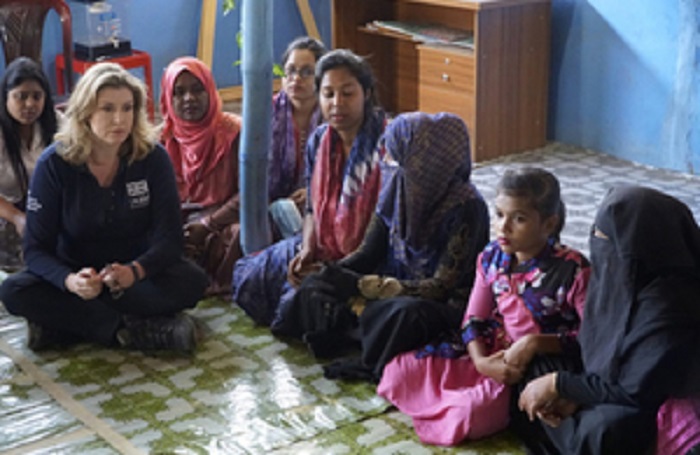The UK is providing vital humanitarian aid to many of the one million Rohingya refugees and vulnerable local communities in Cox’s Bazar.
The plight of the Rohingya refugees must not be forgotten, International Development Secretary Penny Mordaunt said during her second visit to Cox’s Bazar in Bangladesh.
The UK is providing vital humanitarian aid to many of the one million Rohingya refugees and vulnerable local communities in Cox’s Bazar.
Ms Mordaunt, the first UK cabinet minister to visit Bangladesh since the country’s elections, met Rohingya refugees living in Kutupalong camp at a food distribution centre, spoke with women being protected from violence, and saw how children with disabilities were getting the therapy and treatment they need, all supported by UK aid.
Since 25 August 2017, UK aid from British taxpayers has provided £129 million in funding to the refugee crisis and Ms Mordaunt’s visit focused on exploring longer term solutions by supporting education, developing skills and improving access to training opportunities.
In Dhaka, Ms Mordaunt told Bangladeshi ministers she would push for the changes needed in Burma to help the Rohingya return to their homes. But she said now was the time to look beyond short-term live-saving assistance support, to give them the skills they need to create sustainable lives both for themselves and their families.
International Development Secretary Penny Mordaunt said:
This major man-made humanitarian crisis has been ethnic cleansing on an industrial scale and I urge the Government of Burma to create the necessary conditions that would allow those Rohingya currently living in Bangladesh to return.
UK aid and donations from the generous British public, are providing life-sustaining humanitarian assistance to many of the almost one million Rohingya refugees and vulnerable host communities in Cox’s Bazar.
The Government and people of Bangladesh have shown great generosity and humanity in hosting the Rohingya. But we recognise that Bangladesh can’t shoulder this responsibility alone and I’m proud of the UK’s leading.
The plight of the Rohingya refugees to return home must not fall off the international agenda and they must be given justice.
In Dhaka Ms Mordaunt also visited the icddr, b, a world-renowned medical research centre which also houses a hospital specialising in cholera and other water-borne diseases.
UK aid supports the hospital’s research and the development of simple life-saving innovations such as breathing apparatus for small babies that was created using an empty shampoo bottle.
Experts at the hospital have also advised humanitarian workers in Yemen on how to treat deadly outbreaks of cholera.
Ms Mordaunt’s visit builds on the 2017 refugee crisis when the British public donated incredibly generously towards the crisis through the Disasters Emergency Committee (DEC) Appeal, raising £30 million, including £5 million matched pound-for-pound by the UK government.
This funding provided:
- 351,500 people receive life-saving food
- 34,000 families receive household essentials, such as sleeping mats, blankets, clothes, and pots and pans
- 124,400 people have safe drinking water and toilets
- 19,500 families receive materials to build a shelter
- 42,300 people receive medical care and some form of health assistance
- 28,200 vulnerable people receive some form of protection, such as safe spaces for women, children and older people










